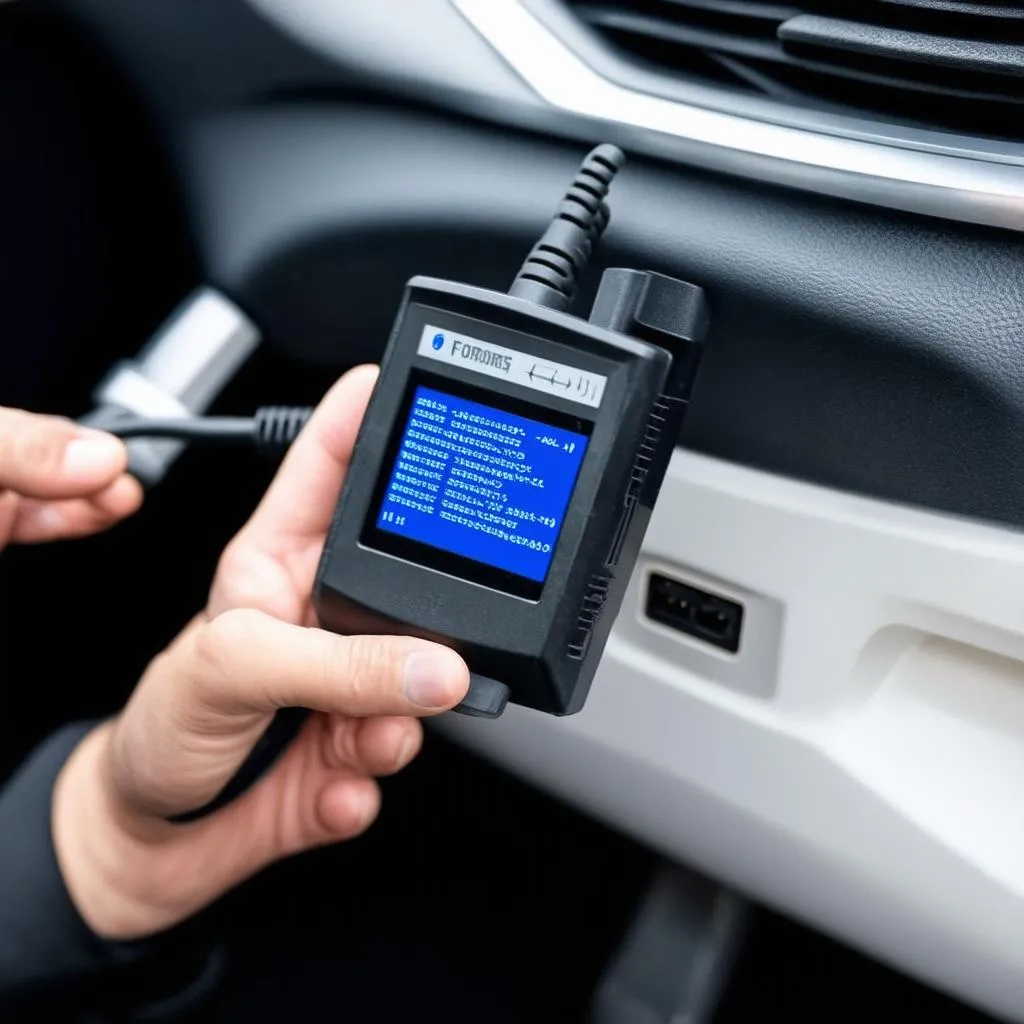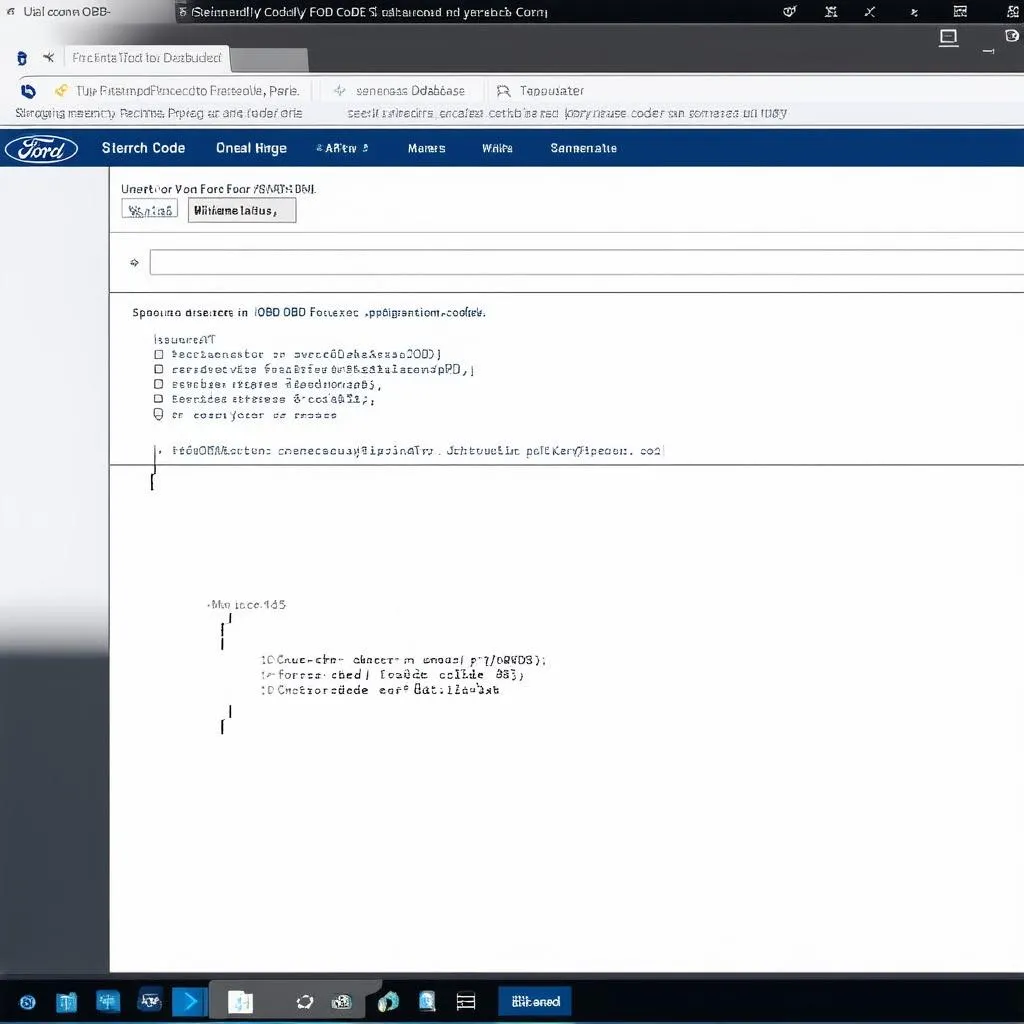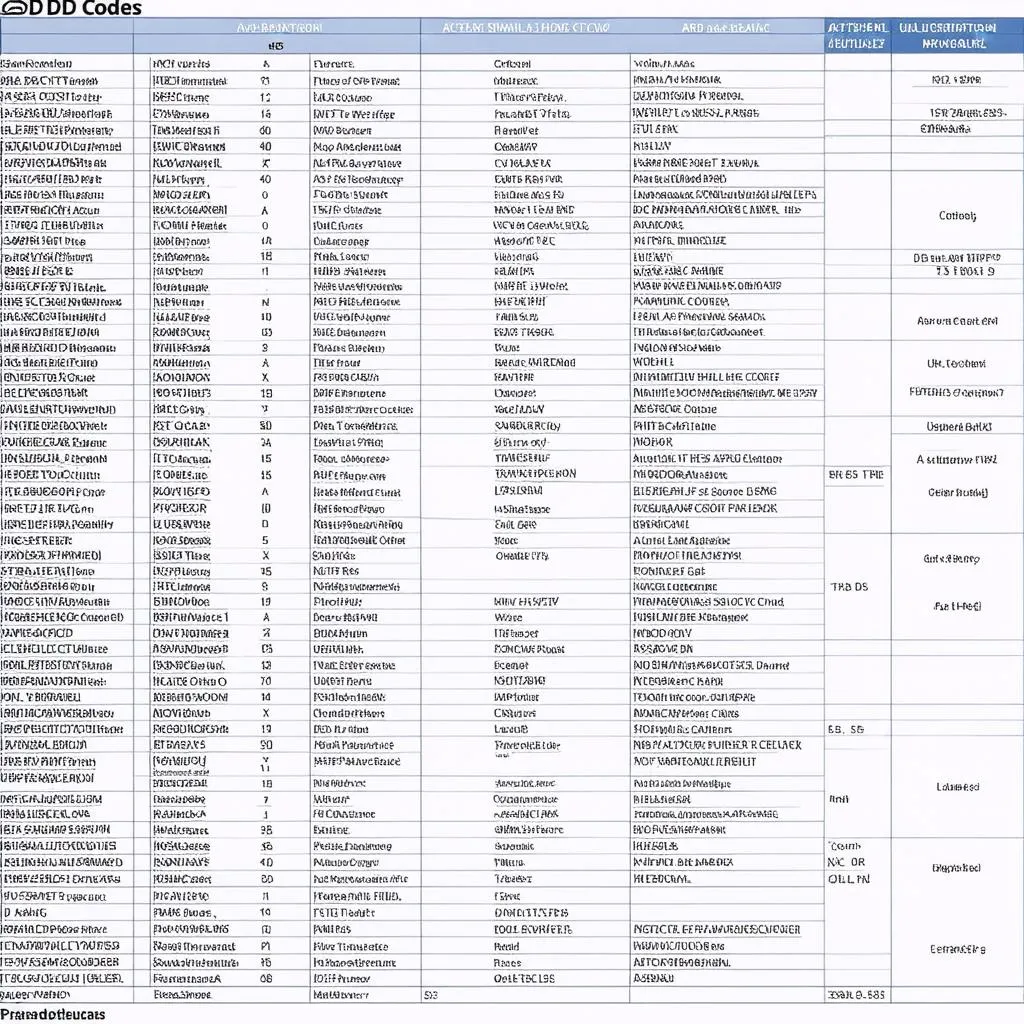Have you ever felt like your Ford was speaking a foreign language? That flashing “check engine” light can send shivers down your spine, leaving you wondering what it means and how to fix it. Luckily, there’s a secret code your Ford uses to communicate its health: OBD codes.
Understanding the Importance of OBD Codes
OBD (On-Board Diagnostics) codes are like a secret decoder ring for your car’s health. These codes are generated by your vehicle’s onboard computer and stored in a memory bank. They reveal valuable information about specific problems or malfunctions within your Ford’s various systems.
Think of it like this: imagine your car is a complex orchestra, and each instrument is a system within the car. When one instrument is out of tune, it sends a signal to the conductor (the onboard computer) who then generates a code to tell you which instrument is playing out of tune.
Deciphering the Ford OBD Code Language: A Beginner’s Guide
So, what do these codes mean? Ford OBD codes are usually a combination of letters and numbers, and each code has a specific meaning.
For example:
- P0171 – This code usually indicates a problem with the fuel mixture, specifically a “System Too Lean” issue.
- P0300 – This code signals a “Random/Multiple Cylinder Misfire Detected” which can be caused by various factors including faulty spark plugs or ignition coils.
Where to Find Ford OBD Codes: The Diagnostic Tools
Obtaining these codes requires a bit of tech savvy. You’ll need a tool called a “code reader” or a “scan tool” which plugs into your car’s OBD port. You can find these tools at your local auto parts store, online retailers like Amazon, or at your trusted mechanic.
There are several different types of OBD tools available, ranging from basic code readers to more advanced scanners:
- Basic OBD Code Readers: These are simple devices that can read and display basic OBD codes. They are affordable and easy to use but may not provide as much detailed information as more advanced scanners.
- Advanced OBD Scanners: These scanners offer more comprehensive features, allowing you to access more advanced data, clear trouble codes, and even perform live data monitoring. They can be more expensive than basic code readers.
Decoding the Code: Common Ford OBD Codes and their Meanings
Common OBD Codes in Ford Vehicles
Here’s a breakdown of some of the most common Ford OBD codes:
P Codes: These are powertrain related codes, indicating problems with your engine and transmission.
B Codes: These are body related codes, indicating issues with body control modules like the door locks, windows, and lights.
C Codes: These codes are chassis-related, indicating issues with the braking, steering, and suspension systems.
U Codes: These codes signify a communication issue within the vehicle’s electronic systems.
Popular Ford Models with Common OBD Codes
Focus: This popular compact car can often throw codes like P0171 (System Too Lean), P0300 (Misfire), and P0420 (Catalyst System Efficiency Below Threshold).
Escape: This SUV can be prone to codes like P0446 (Evaporative Emission System Leak), P0171 (System Too Lean), and P0300 (Misfire).
F-150: This popular truck can have issues with codes like P0446 (Evaporative Emission System Leak), P0300 (Misfire), and P0171 (System Too Lean).
What To Do When You See an OBD Code: Troubleshooting Steps
Don’t panic when you see a code! Instead, follow these steps:
- Write down the code. This will help you find more information about the specific issue.
- Consult a trusted OBD Code database. You can find comprehensive online databases that provide explanations for most Ford OBD codes.
- Identify the problem. Once you understand the meaning of the code, you can start pinpointing the potential cause.
- Consider consulting a mechanic. If you’re not comfortable diagnosing and repairing the issue yourself, it’s best to consult a qualified mechanic.
Preventing Code Troubles: Routine Maintenance and Care
The best way to avoid troublesome OBD codes is to practice preventive maintenance. Here are some tips:
- Regular oil changes: Fresh oil ensures your engine runs smoothly and efficiently, minimizing the risk of codes related to engine performance.
- Spark plug replacement: Worn-out spark plugs can cause misfires and other issues.
- Air filter replacement: A clogged air filter restricts airflow, potentially leading to engine performance issues.
- Fuel system cleaning: A dirty fuel system can lead to various issues, including misfires and fuel pressure problems.
Seeking Professional Help: Techcarusa.com is Here to Support You
If you’re struggling to understand an OBD code or need help diagnosing a problem, don’t hesitate to reach out. Techcarusa.com offers a comprehensive range of services and resources to support you.
Our services include:
- Comprehensive OBD code database: Our online database provides explanations for most Ford OBD codes, helping you understand the meaning behind the code and identify potential causes.
- Expert diagnostics: Our team of experienced mechanics is available to assist you with diagnosing and repairing your Ford.
- Genuine parts: We offer a wide selection of high-quality parts for all Ford models, ensuring your repairs are done with the best possible components.
 OBD Code Reader
OBD Code Reader
Frequently Asked Questions
1. How do I clear an OBD code?
You can typically clear an OBD code using a code reader or scan tool. However, simply clearing the code won’t fix the underlying problem.
2. What is the difference between a code reader and a scan tool?
A code reader can only read and display OBD codes, while a scan tool provides more advanced features like live data monitoring, graphing, and freeze frame data.
3. Can I fix the problem myself after reading an OBD code?
Depending on the complexity of the issue, you may be able to fix it yourself. However, some problems require professional expertise.
4. How often should I check for OBD codes?
It’s a good idea to check for OBD codes at least once a year, or more frequently if you notice any unusual driving symptoms.
5. I have a new Ford, but it’s showing an OBD code. Is this normal?
It’s not unusual for newer cars to have an occasional OBD code. It doesn’t necessarily mean there’s a serious problem. The onboard computer can be very sensitive to slight fluctuations. However, it’s always best to get it checked out by a mechanic to ensure the issue isn’t something more serious.
Explore More with Techcarusa.com
To learn more about Ford OBD codes, OBD tools, or other automotive topics, explore our website Techcarusa.com. You can find comprehensive guides, reviews, and information on a wide range of automotive topics.
 OBD Code Database
OBD Code Database
 OBD Code Chart
OBD Code Chart
Connect with us:
Do you have any questions about Ford OBD codes or need help diagnosing a problem? Our team of expert mechanics is available 24/7 to assist you. Contact us via WhatsApp at +84767531508.
